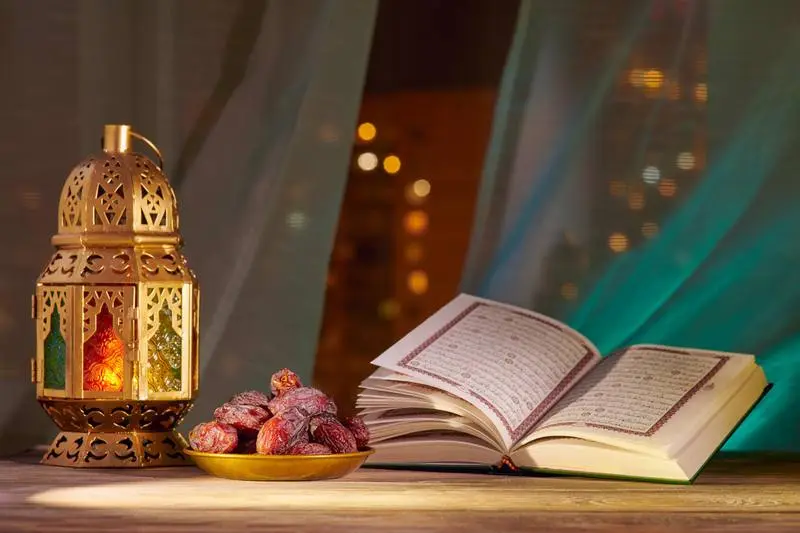Ramadan, the ninth month of the Islamic lunar calendar, holds great significance for Muslims worldwide. It is a sacred month during which Muslims observe fasting from sunrise to sunset, refraining from food, drink, sexual activities, smoking, and other actions that may invalidate the fast. Fasting in Ramadan is one of the five pillars of Islam and is obligatory for all adult, sane, and physically capable Muslims.
For Muslims, Ramadan is a time to draw closer to Allah, renew their spirituality, and reflect on the blessings bestowed upon them. It is a period of self-discipline, patience, and solidarity with the less fortunate. The fast begins with a pre-dawn meal called Suhoor and ends with an evening meal called Iftar after sunset. Following the tradition of the Prophet Muhammad (peace be upon him), it is recommended to break the fast with dates and water before enjoying a main meal. Iftar is often a social gathering, where family and friends come together to break their fasts at homes or in mosques.
During Ramadan, Muslims engage in extensive worship and recitation of the Qur’an. The holy book is read and studied with great devotion. Special prayers are held in mosques during the nights of Ramadan, and it is believed that Laylat al-Qadr (the Night of Power) occurs during one of the last ten nights of the month. Worship, supplication, and prayer intensify during this period as Muslims seek spiritual enlightenment and closeness to Allah.
Ramadan is also a time for charity and giving. Muslims fulfill their obligation of Zakat, which is obligatory charity, by donating to the poor and needy. Additionally, they engage in Sadaqah, voluntary acts of charity, to further help those in need. This emphasis on giving back to the community fosters a sense of compassion and empathy among Muslims.
It is important to note that there are exemptions from fasting in Ramadan. Young children, the sick, pregnant and breastfeeding women, the elderly, and travelers are among those who are exempt. They can make up for missed fasting days later in the year by fasting the days they missed or by paying fidyah, a form of compensation.
Ramadan holds a special place in the lives of Muslims as they strive for spiritual success and seek to draw closer to Allah. Through fasting, worship, and good conduct towards others, Muslims aim to purify their souls and strengthen their faith. It is a time of reflection, self-discipline, and gratitude for the blessings bestowed upon them. Ramadan serves as a reminder of the importance of compassion, charity, and unity among all individuals, regardless of their beliefs.
, Ramadan is a significant month in the Islamic calendar, observed by Muslims worldwide. It is a time of fasting, worship, and reflection, during which Muslims strive to strengthen their faith and draw closer to Allah. The month is characterized by self-discipline, patience, and acts of charity. Through fasting, Muslims experience a sense of solidarity with the less fortunate and cultivate gratitude for their blessings. Ramadan is a time of spiritual growth and an opportunity for Muslims to renew their commitment to their faith and their community.

رمضان هو تاسع شهور الهجرة في التقويم الإسلامي ويعتبر شهرًا مقدسًا للمسلمين في جميع أنحاء العالم. خلال شهر رمضان، يصوم المسلمون من شروق الشمس حتى غروبها، ويمتنعون عن تناول الطعام والشراب والمشروبات والممارسات الجنسية والتدخين وغيرها من الأشياء التي تُعتبر مفطرة خلال فترة الصيام.
الصوم في رمضان يعتبر واحدًا من أركان الإسلام الخمسة، ويعتبر فرضًا على كل مسلم بالغ وعاقل وقادر على الصيام. يعتبر صوم رمضان فرصة للمسلمين للتقرب من الله وتجديد الروحانية والتفكر في النعم التي وهبها الله لهم، ولكنه أيضًا يمثل فترة امتحان للتحكم في الشهوات وتعلم الصبر والتضامن مع الفقراء والمحتاجين.
يتم فتح الصيام بوجبة السحور قبل طلوع الفجر، ويُفطر الصيام بتناول وجبة الإفطار بعد غروب الشمس. وعادة ما يُفضل أن يكون الإفطار بتمرات وماء، على طريقة سنة النبي محمد صلى الله عليه وسلم، ثم يتبعها وجبة رئيسية. يعتبر وجبة الإفطار وجبة اجتماعية تقام في المنازل أو في المساجد حيث يجتمع المسلمون لتناول الطعام معًا بعد يوم من الصيام.
رمضان هو أيضًا شهر العبادة والتلاوة، حيث يُقرأ القرآن الكريم بشكل مكثف وتُقام صلوات خاصة في المساجد خلال الليالي الرمضانية. كما يعتبر رمضان فرصة للتصدق والعطاء، حيث يتبرع المسلمون بالزكاة والصدقات للفقراء والمحتاجين.
تُعتبر ليالي العشر الأواخر من رمضان أكثرها تفضيلاً، حيث يُعتقد أن ليلة القدر توجد في إحدى هذه الليالي. في هذه الفترة، يكثر العبادة والتضرع والدعاء.
قول العديد من الأدعية خلال شهر رمضان. التي يمكن أن تقال في هذا الشهر المبارك:
- الدعاء للهداية: “اللهم اهدني فيمن هديت، وعافني فيمن عافيت، وتولني فيمن توليت، وبارك لي فيما أعطيت، وقني شر ما قضيت، فإنك تقضي ولا يقضى عليك، وإنه لا يذل من واليت، تباركت ربنا وتعاليت.”
- الدعاء لمغفرة الذنوب: “اللهم إني أسألك العفو والعافية في الدنيا والآخرة، اللهم إني أسألك العفو والعافية في ديني ودنياي وأهلي ومالي، اللهم استر عوراتي وآمن روعاتي، اللهم احفظني من بين يدي ومن خلفي وعن يميني وعن شمالي ومن فوقي، وأعوذ بعظمتك أن أغتال من تحتي.”
- الدعاء لتقبل الأعمال: “اللهم تقبل مننا واجعلنا من عبادك الصالحين، اللهم اجعلنا من الذين يصومون ويقومون ويتصدقون ويتلون كتابك الكريم، اللهم اجعلنا من المقبولين واجعلنا من المغفور لهم واجعلنا من المجاهدين في سبيلك.”
- الدعاء للرحمة والمغفرة: “اللهم إنك عفو تحب العفو فاعف عني.”
- الدعاء لتحقيق النجاح والتوفيق: “اللهم إني أسألك علمًا نافعًا، ورزقًا طيبًا، وعملًا متقبلًا.”
- الدعاء للمسلمين والمسلمات: “اللهم اغفر للمؤمنين والمؤمنات، الأحياء منهم والأموات، اللهم ارحمنا جميعًا واجمعنا في جنتك.”

فضل شهر رمضان.
وردت العديد من الآيات القرآنيةوالأحاديث النبوية التي تتحدث عن فضل شهر رمضان وعن الثواب الذي يجنيه المسلم جراء تأدية هذا الركن من أركان الإسلام، فمن أفضال شهر رمضان المبارك ففيه تفتح أبواب الجنان وتغلق أبوابُ النيران[10]، وتُصفد مردة الشياطين أي كِبارها فيكونُ للمُسْلِمُ الفرصة الكبرى في تجنب المعاصي والتقرب من الله تعالى بالعبادات والطاعات التي تقربه من الجنة وتبعده عن النار، عن أبي هريرة، قال رسول الله ﷺ: «إِذَا كَانَ أَوَّلُ لَيْلَةٍ مِنْ شَهْرِ رَمَضَانَ صُفِّدَتِ الشَّيَاطِينُ وَمَرَدَةُ الْجِنِّ، وَغُلِّقَتْ أَبْوَابُ النَّارِ، فَلَمْ يُفْتَحْ مِنْهَا بَابٌ، وَفُتِّحَتْ أَبْوَابُ الْجَنَّةِ فَلَمْ يُغْلَقْ مِنْهَا بَابٌ، وَيُنَادِي مُنَادٍ: يَا بَاغِيَ الْخَيْرِ أَقْبِلْ، وَيَا بَاغِيَ الشَّرِّ أَقْصِرْ. وَلِلَّهِ عُتَقَاءُ مِنَ النَّارِ، وَذَلكَ كُلُّ لَيْلَةٍ» ابن ماجه. ورمضان هو شهر فرض الله صيامه وهو شهر غفران الذنوب وكسب الثواب والرضى والتقرب من الله وإجابة الدعوات لقول الله تعالى ﴿شَهْرُ رَمَضَانَ الَّذِي أُنْزِلَ فِيهِ الْقُرْآنُ هُدًى لِلنَّاسِ وَبَيِّنَاتٍ مِنَ الْهُدَى وَالْفُرْقَانِ فَمَنْ شَهِدَ مِنْكُمُ الشَّهْرَ فَلْيَصُمْهُ وَمَنْ كَانَ مَرِيضًا أَوْ عَلَى سَفَرٍ فَعِدَّةٌ مِنْ أَيَّامٍ أُخَرَ يُرِيدُ اللَّهُ بِكُمُ الْيُسْرَ وَلَا يُرِيدُ بِكُمُ الْعُسْرَ وَلِتُكْمِلُوا الْعِدَّةَ وَلِتُكَبِّرُوا اللَّهَ عَلَى مَا هَدَاكُمْ وَلَعَلَّكُمْ تَشْكُرُونَ ١٨٥ وَإِذَا سَأَلَكَ عِبَادِي عَنِّي فَإِنِّي قَرِيبٌ أُجِيبُ دَعْوَةَ الدَّاعِ إِذَا دَعَانِ فَلْيَسْتَجِيبُوا لِي وَلْيُؤْمِنُوا بِي لَعَلَّهُمْ يَرْشُدُونَ ١٨٦﴾ [البقرة:185–186].[الآية 1] ورمضان هو شهر نزول القرآن وذلك في ليلةً تعتبر أعظم ليلة في السنة، وهي ليلة القدر وهي خير من ألف شهر وهي ليلة القدر فقال الله تعالى في سورة القدر: ﴿إِنَّا أَنْزَلْنَاهُ فِي لَيْلَةِ الْقَدْرِ ١﴾ [القدر:1][الآية 2]، وفي سورة الدخان: ﴿إِنَّا أَنْزَلْنَاهُ فِي لَيْلَةٍ مُبَارَكَةٍ إِنَّا كُنَّا مُنْذِرِينَ ٣﴾ [الدخان:3].[الآية 3] ورمضان شهر الجود والكرم والإحسان وشهر تلاوة القرآن والإكثار من الصدقات وهو شهر الصبر، فإن الصبر لا يتجلى في شيء من العبادات كما يتجلى في الصوم، ففيه يحبس المسلم نفسه عن شهواتها ومحبوباتها، ولهذا كان الصوم نصف الصبر، وجزاء الصبر الجنة، قال تعالى: ﴿قُلْ يَا عِبَادِ الَّذِينَ آمَنُوا اتَّقُوا رَبَّكُمْ لِلَّذِينَ أَحْسَنُوا فِي هَذِهِ الدُّنْيَا حَسَنَةٌ وَأَرْضُ اللَّهِ وَاسِعَةٌ إِنَّمَا يُوَفَّى الصَّابِرُونَ أَجْرَهُمْ بِغَيْرِ حِسَابٍ ١٠﴾ [الزمر:10]
